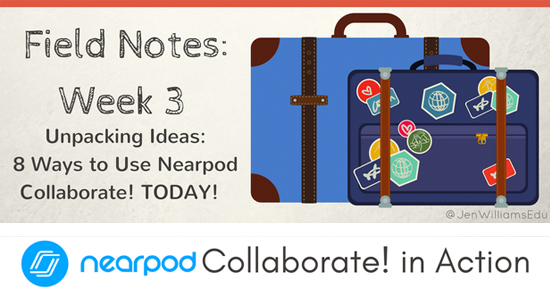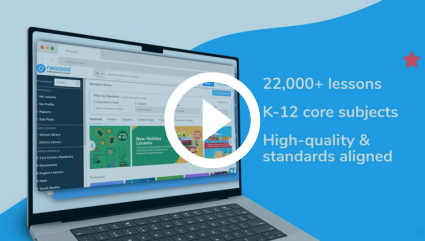
Field Notes Week 3: 8 Ways to Use Nearpod Collaborate! TODAY!
By Jennifer Williams
Across grades and content areas. For engagement, assessment, and crowdsourcing ideas. Our month-long journey exploring ways teachers are creatively using Nearpod’s Collaborate! in classrooms across our country has returned us back to “home.” And, one thing is quite certain–teachers are a remarkable bunch! Each day in our schools, they are seeking out ways to connect students meaningfully to concepts, and they are purposefully using resources to inspire students to think “beyond the page” and invent their own learning. Collaborate! as an interactive virtual discussion board has already brought limitless possibilities to instruction, and one of the very best parts has been seeing the ways all students in a class can feel part of a conversation. Ready to put Collaborate! into practice with your students? As we unpack ideas shared along our journey, here are eight extraordinary examples of ways teachers are putting Collaborate! into action.
1. Six Word Stories
Six Word Stories are short, short stories that encourage young writers to succinctly organize thoughts and ideas. With an aim of being concise and direct, the messages often center on topics that evoke deep emotion, humor, or insight. This week, Courtney Kofeldt, a K-12 Educational Technology Director, and fellow Nearpod PioNear, shared on Six Word Stories in a Bite Size PD session at her school in West Chester, Pennsylvania. With a focus on digital storytelling, teachers were invited to create their own six-word stories using Spark Post from Adobe, and then they shared their finished creations with the group using Nearpod Collaborate!. In real time, teachers were able to see the shared examples and discuss ideas! How creative! LINK to ClassBoard.

2. Teaching Future Teachers
So often, transformational change in education starts with how we prepare our pre-service teachers. Following this, many university programs today are placing dedicated efforts on infusing meaningful learning with new age technologies into all college of education courses. Integration specialist and PioNear Laurie Guyon put this into practice with students at Skidmore College in New York by sharing and modeling high-quality edtech tools in her own instruction. This week, Laurie was able to share on Nearpod with Junior block students in a workshop on integrating technology into literacy lessons. Students were able to see the great ways Nearpod interactive features can encourage engagement and communication of ideas, and then they got to jump in by using Collaborate! to share authentically on ways they felt Nearpod could be used with students in their future classrooms. Check out all their amazing ideas: LINK to ClassBoard. Especially love this shared idea: if you introduce a new topic you can use the poll to gauge students’ background knowledge on the topic and then have them share to the class. What a wonderful way to bring in the voice of each student.
3. A World of Ideas
Each year, teachers of the world join together to connect students around selections of stories in the Global Read Aloud project. The world becomes a classroom as students engage in lessons with international classes to discuss and analyze text collaboratively. As a Grade 3 teacher in Ontario, Canada, PioNear Vickie Morgado was eager to bring the conversation on her class readings of The BFG to a larger audience using the new Collaborate! feature of Nearpod. To extend the conversation out to the world, she shared her Nearpod lesson code on Twitter and invited teachers within her PLN to join in on a prediction activity with their students. Over several days, students from near and far shared ideas and posted what they anticipated would happen in the next chapter of the book. Such a wonderful example of students working together beyond classroom walls! Check out the shared ClassBoard HERE.
Using the new collaboration feature in @nearpod to make predictions in #GRABFG join us with the code DXPHW #3rdchat #GRA #2ndchat pic.twitter.com/EVcHA4ScHd
— Mrs Morgado (@MrsMorgado1) November 4, 2016
4. Virtual Team Teaching
Fourth-grade teachers, Rachel Thomas and Steven Lamb (better known on Twitter as Collaborative Genius), are reinventing the concept of “team teaching!” Each week, the two Albuquerque, New Mexico teachers come together in what they have termed Virtual Team Teaching (VTT), and, though at schools eight miles apart, they join with their classes using video conferencing, a variety of technology tools, and innovative teaching practices to engage their together 50 students in interactions and inspired lessons. Use of Collaborate! has enabled their students to document and share on understandings of rocks, circuits, and even their personal learning environments. This past week, the classes joined in a science lesson where each group simultaneously examined a human heart. Videoconferenced conversation was supported with the Collaborate! discussion board which also served to inform learning as a reflection and assessment tool. Such a WOW! Learn more about their extraordinary journey on their website, and be sure to catch their upcoming TEDx Talk where audience members will too be joining on a Collaborate! board!
5. Making Time for Reflection Adds Up
For years and years, learning to count and add money has been a staple lesson in early elementary—but, with Collaborate!, 2nd-grade teacher Gabrielle Cinelli found a way to make it not only engaging and collaborative for her students, but also reflective to extend learning. Gabrielle’s young students were able to seek out evidence and document knowledge on the interactive discussion board, and then, were encouraged to make deeper connections to concepts through self-evaluations and shared personal reflections on the process of counting. The class also used DrawIt, Nearpod’s version of an interactive whiteboard, in a counting money activity which was then captured in a graphic collage that was sent right to Gabrielle’s email inbox! How fun!


6. Digital Citizens Get Social
In addition to having access to the Common Sense Media K-12 Digital Citizenship Curriculum in the Nearpod Content Library, California Tech Coach and PioNear Joe Marquez is finding innovative ways to engage his middle school students in discussions on social media etiquette and the importance of cultivating a positive digital footprint for college and career readiness. In his classes, students participate in Twitter EdUniversity and receive their “Twitter Learner’s Permit.” This semester, Joe and his students were able to use Collaborate! during their lessons to share their ideas as they selected their “handles.” Click here to view his ClassBoard, and be sure to follow Joe on Twitter and Periscope at @JoeMarquez70 to learn about all his great ideas on empowering students with technology!
7. Self-Assessment: Español Style
As a Nearpod Certified Educator and PioNear, Foreign Language teacher Rachelle Poth uses the Nearpod platform throughout the day in her Spanish classes in all forms of language study—reading, writing, listening, and speaking. In recent weeks, Rachelle has incorporated the new Collaborate! feature into class lessons with activities such as photo scavenger hunts in cultural studies, open-ended sharing of foods, dishes, and recipes common to Mexico, and reflective lessons on language use. For one Collaborate! lesson, she asked students to engage in a self-assessment exercise that had them considering areas in which they may need additional help. To guide them further, areas of focus were indicated as verbs, grammar, and vocabulary. Check out the ClassBoard to see how her students were also able to reflect on others’ responses with the heart icons. Rachelle shared that in addition to self-assessments, a benefit for her as a teacher is the ability to delete or reinstate answers as needed. Truly fantastic!

8. Little Learners and Big Elephants
Collaborate! can be an effective learning tool for students both old and young. Kindergarten students in Kali Kopka‘s class were able to jump into a cross-curricular literacy/science lesson in their non-fiction unit called “All About Elephants.” To gauge background understandings before the daily lesson, Kali welcomed her little learners to each add one fact about elephants using Collaborate!. Next, the kindergarteners watched a video and then did a reflection activity using DrawIt. For Kali, the data obtained and recorded in the Teacher Report was instrumental in guiding her next lessons. And, how precious are these responses:


With Collaborate! now available for all teachers, the journey really is just beginning! Please share ways you are using Nearpod and Collaborate! with your students by sharing your ClassBoards and photos on social media! Happy collaborating!
Special thanks to all the amazing teachers and students that kindly shared their learning this month! Celebrating you all each and every day!
Find Jennifer’s original blog post here.

Nearpod’s award-winning platform is used by thousands of schools around the globe, transforming classroom engagement.

